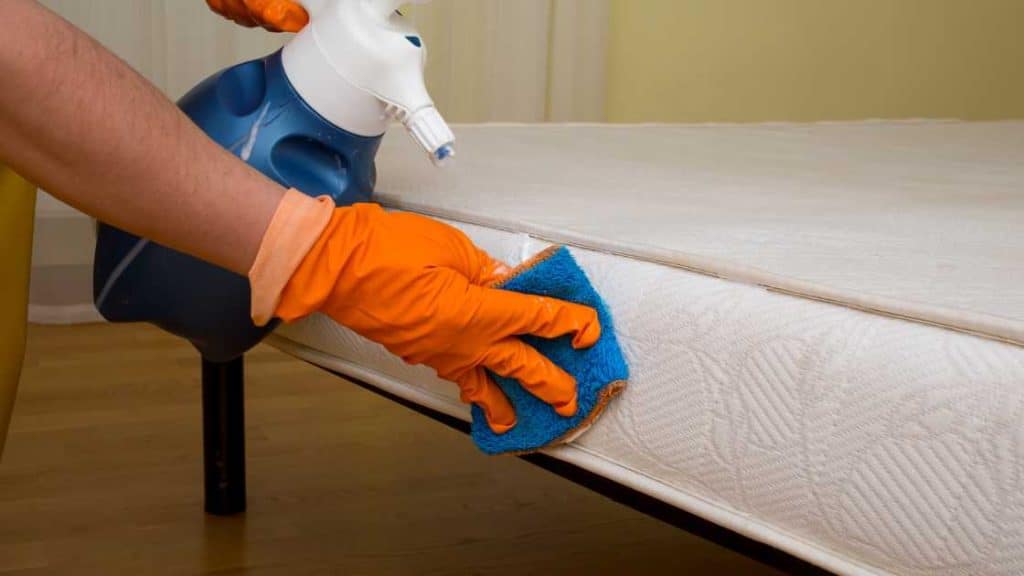Yes, you can bleach a mattress, but it requires careful dilution and application. Diluted bleach can disinfect and remove stains when used properly.
Maintaining a clean sleeping environment is crucial, and occasionally, a mattress might need more than just vacuuming and spot cleaning. For a more thorough cleanse, especially when dealing with tough stains or disinfecting after an illness, bleach can be an effective option.
When considering mattress cleaning, a common question arises: Can You Bleach a Mattress? Diluted household bleach is your go-to solution, as it can kill bacteria and viruses while brightening the appearance of your mattress.
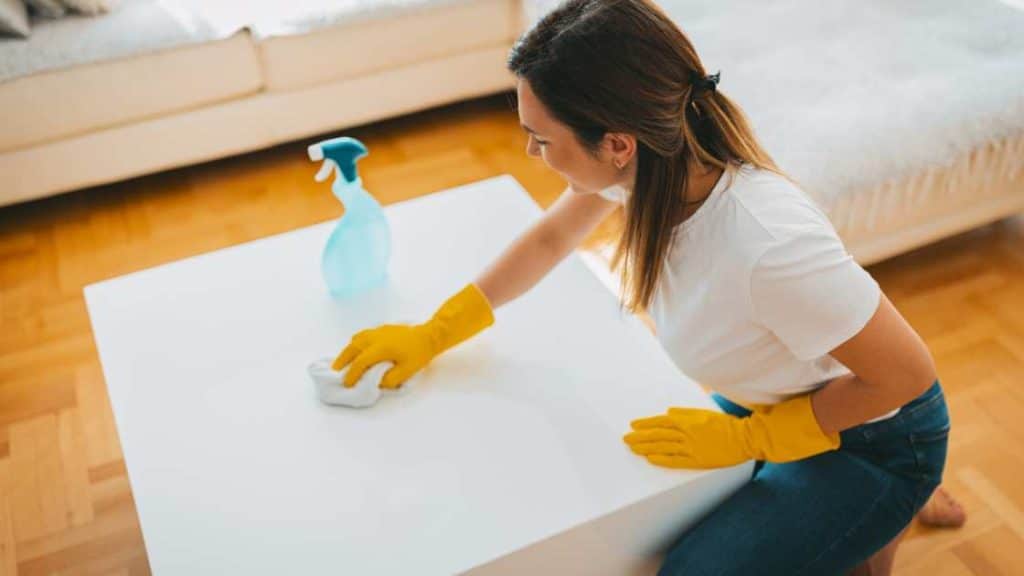
Nevertheless, the process must be undertaken with caution, as bleach is a potent chemical that can damage the fabric or cause discoloration if not used correctly. It’s important to ensure adequate ventilation in the area to avoid inhaling fumes.
Furthermore, always conduct a spot test in an inconspicuous area before proceeding with the entire mattress to prevent unwanted damage.
Mattress Hygiene And Cleaning
When it comes to keeping a home clean and hygienic, don’t overlook your mattress. It’s where you spend roughly a third of your life, after all.
The ‘Understanding Mattress Hygiene and Cleaning’ section dives into how to maintain a clean sleeping environment. Let’s eliminate any confusion and talk about why a clean mattress matters.
The Importance Of Keeping Your Mattress Clean
- Removes allergens: Dust mites and skin cells accumulate over time.
- Prevents odors: Sweat and moisture can cause unpleasant smells.
- Increases lifespan: Regular cleaning extends your mattress’s life.
Common Misconceptions About Mattress Cleaning
| Misconception | Reality |
|---|---|
| Bleaching is the best method | Too harsh for most mattresses, and can damage fabric |
| Vacuuming doesn’t help | Removes dust, mites, and debris effectively |
| Flip the mattress instead of cleaning | Flipping helps but does not clean the mattress |
What Is Bleach And How Does It Work?
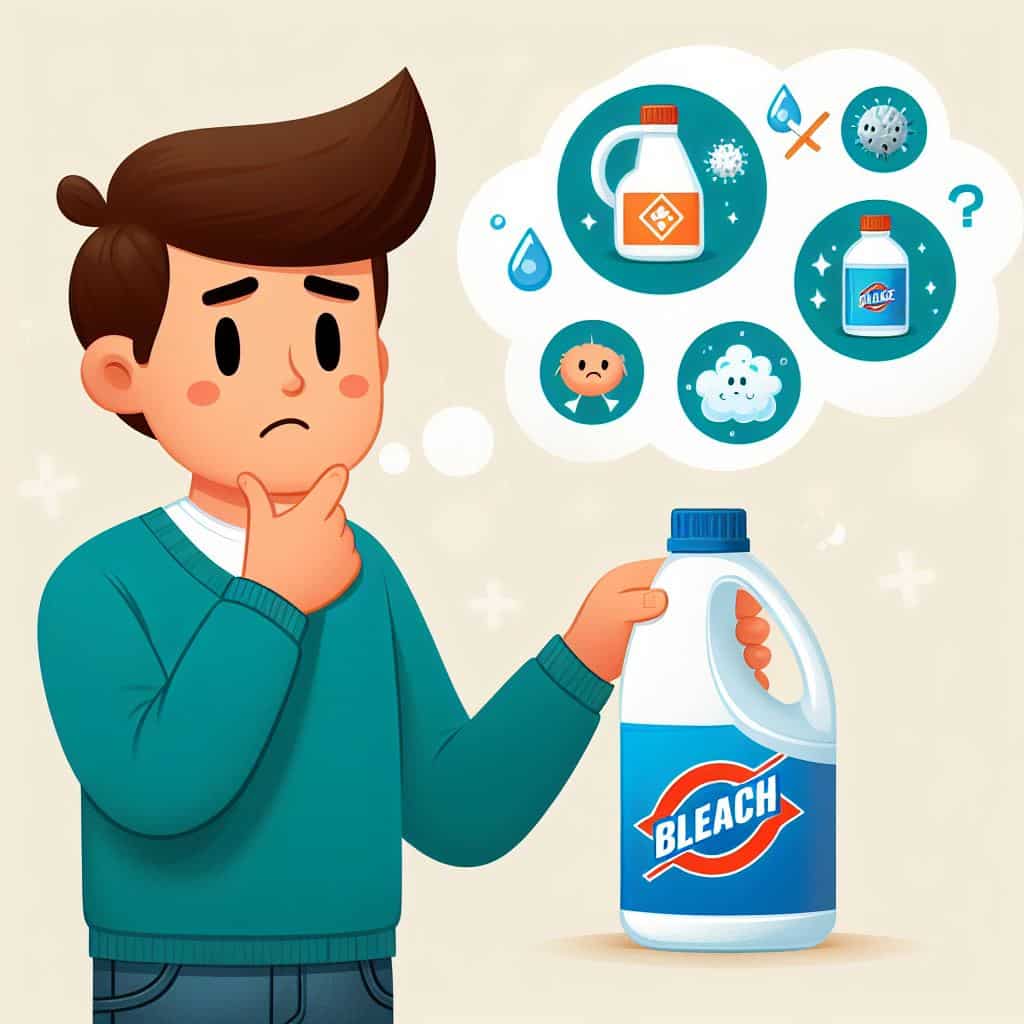
Ever wonder how bleach works its magic? It’s a common household item, but there’s more to it than meets the eye. Let’s dip into the world of bleach and understand its chemical prowess, especially when considering something as delicate as a mattress.
The Chemical Composition Of Bleach
Bleach is a powerful substance with a simple formula. At its core, bleach contains sodium hypochlorite (NaOCl). This compound is the active ingredient that gives bleach its strong cleaning abilities.
| Compound | Chemical Formula | Function |
|---|---|---|
| Sodium Hypochlorite | NaOCl | Cleans and disinfects |
| Water | H2O | Dilutes |
When mixed with water, sodium hypochlorite forms hypochlorous acid (HOCl), the active agent that breaks down dirt and microbes.
Bleach As A Disinfectant And Cleaning Agent
Bleach not only cleans but also disinfects surfaces. It’s extremely effective at killing bacteria, viruses, and fungi. Here’s what bleach does:
- Disrupts microbial cells: destroying germs on contact.
- Breaks up stains: making them easy to wash away.
- Whitens fabrics: restoring brightness.
Due to its strong nature, always use bleach with caution. Proper dilution is key to safety and effectiveness. When applied carefully, bleach can be a transformative tool for deep cleaning a mattress.
Can You Bleach A Mattress? Debunking Myths
Welcome to the segment where we shine the light on common misconceptions about mattress care, specifically tackling the question: Can You Bleach a Mattress? Debunking Myths.
The Feasibility Of Using Bleach On Mattresses
Bleach is famed for its disinfecting prowess. Yet, when it comes to mattresses, the scenario is tricky. Many believe bleach can remove stains and sanitize. Is this true?
- Bleach may tackle stains and kill germs.
- It works better on hard, non-porous surfaces.
- For mattresses, a gentler approach often yields better results.
Many manufacturers recommend against harsh chemicals. Products meant for mattress care are safer and more appropriate.
Risks Associated With Bleaching A Mattress
Bleaching might seem like a good idea, but it is not without risks. Here’s what could go wrong:
| Risk | Reason |
|---|---|
| Material Damage | Bleach can weaken and damage fibers. |
| Color Fading | It can cause discoloration and fading. |
| Health Hazards | Inhaling bleach fumes is harmful to your health. |
Furthermore, bleach may not reach the inner layers of the mattress where mites and bacteria reside. This proves its inefficiency in deep cleaning a mattress.
Choosing alternative cleaning methods is better for mattress longevity and health concerns. Simple solutions like baking soda and vinegar do wonders without the harsh side effects.
The Pros And Cons Of Bleaching A Mattress
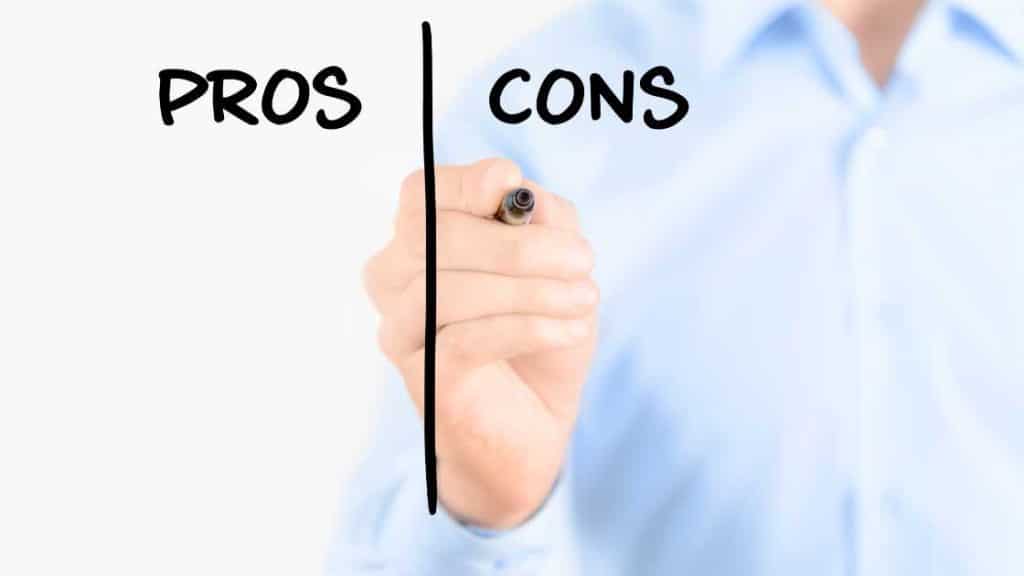
Cleanliness and hygiene are essential for a good night’s sleep. Disinfecting a mattress might involve bleaching, but it’s important to weigh the benefits and potential drawbacks. Let’s explore the reasons why someone might consider bleaching their mattress, alongside the potential risks involved.
Potential Benefits Of Using Bleach On A Mattress
- Eliminates Bacteria and Viruses: Bleach is a powerful disinfectant that can kill most germs.
- Removes Tough Stains: It often removes stains that other cleaners cannot.
- Whitens and Brightens: Bleach can make a dingy mattress look fresher.
Downsides Of Using Bleach On Mattress Materials
Bleach is harsh. It can damage mattress fibers and fabrics. Mattresses come in many types, and not all can handle bleach.
| Material | Risk |
|---|---|
| Memory Foam | Can break down the material |
| Latex | Might cause deterioration |
| Fabrics | Possible discoloration and weakening |
Using bleach can also lead to respiratory issues from fumes. It’s essential to ensure proper ventilation and consider less aggressive alternatives like baking soda or vinegar.
Safety Precautions When Using Bleach
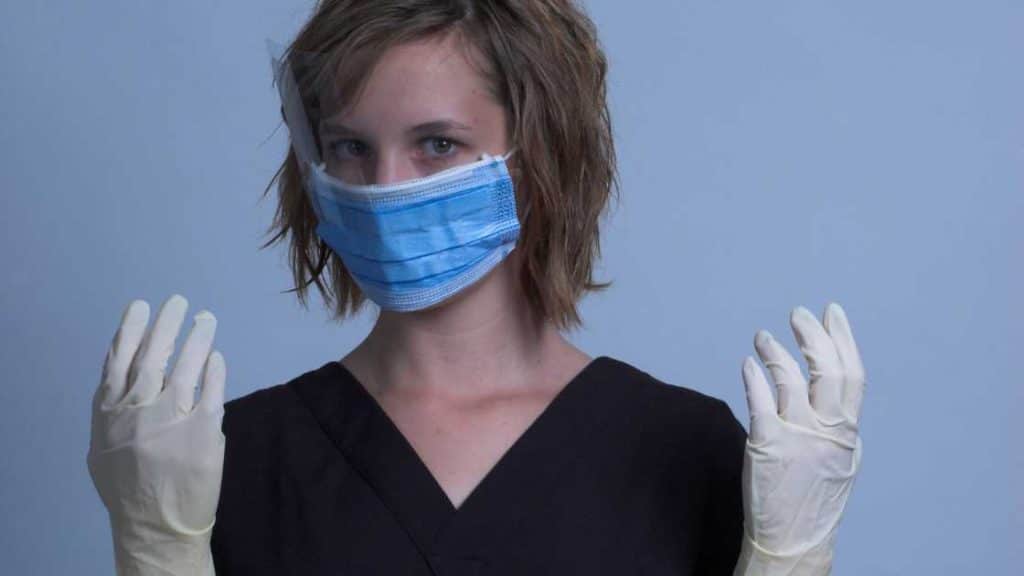
Taking safety precautions when using bleach on a mattress is vital. Bleach is a powerful disinfectant, effective in tackling stains and killing germs.
Yet, it can pose risks if used carelessly. This section covers key safety measures to ensure your well-being and protect your mattress during the bleaching process.
Personal Safety Measures
Personal protection is paramount when handling bleach. Here are steps to stay safe:
- Wear protective gloves to shield your hands from irritation.
- Use a mask or ventilator to avoid inhaling fumes.
- Don eye protection to prevent splashes in your eyes.
- Work in a well-ventilated area to ensure fresh air circulation.
- Keep children and pets away from the work zone.
Protecting The Mattress And Environment
Protect your mattress and surroundings with these tips:
- Dilute bleach properly by following the manufacturer’s guidelines.
- Test a small, hidden mattress area to check for colorfastness.
- Use a minimal amount to avoid soaking and damaging the mattress.
- Apply the solution with care, targeting only stained or affected areas.
- Dispose of any bleach rags responsibly to prevent environmental harm.
Alternatives To Bleaching A Mattress
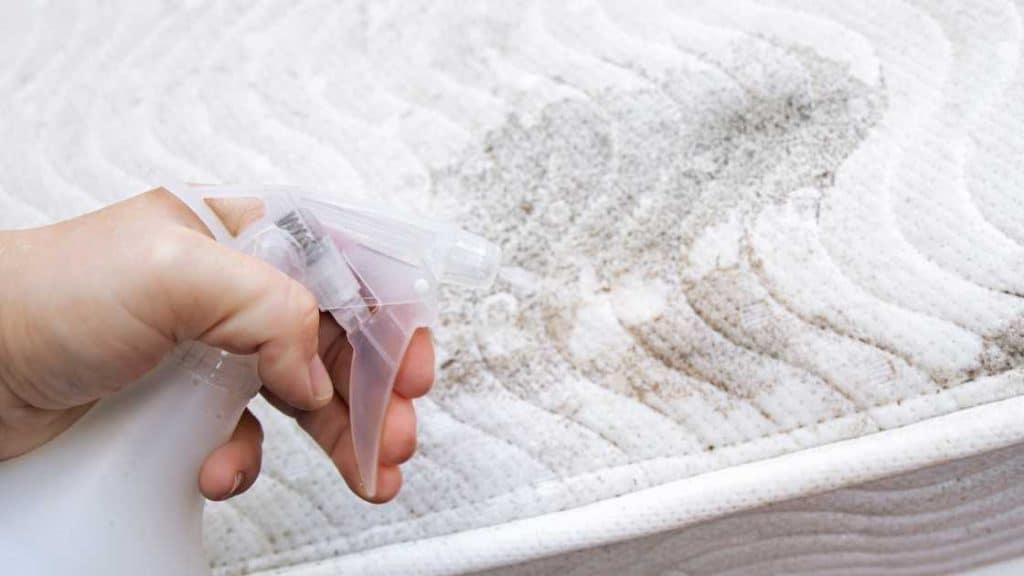
Are you wary of using harsh chemicals on your mattress? Fear not! There are safer methods to refresh your sleeping haven. These alternatives are not only effective but also kinder to your mattress and health.
Natural And Milder Chemical Alternatives
Let’s explore natural and gentler options that can perform wonders:
- Baking Soda: Sprinkle generously, let it sit, and then vacuum.
- Vinegar Solution: Mix equal parts white vinegar and water in a spray bottle. Spritz lightly over the stain and blot with a clean, dry cloth.
- Essential Oils: A few drops of lavender or eucalyptus can provide a fresh scent and mild antibacterial action.
- Lemon Juice: Its natural acidity works well on light stains and odors.
- Enzyme Cleaners: These break down organic material without harming fabric fibers.
Professional Mattress Cleaning Options
For deeper cleaning, consider the following:
| Service | Description | Benefits |
|---|---|---|
| Steam Cleaning | Hot water extraction penetrates mattress materials. | Removes deep-seated dirt and allergens. |
| Dry Cleaning | Uses minimal moisture and eco-friendly solvents. | Quick drying and less risk of mold growth. |
| UV Cleaning | Ultraviolet light kills germs and dust mites. | Non-toxic and adds no moisture to your mattress. |
Professional mattress cleaning is thorough. They use specialized tools and techniques. A clean mattress improves sleep quality. Experts are just a call away.
Step-by-step Guide To Cleaning A Mattress Without Bleach
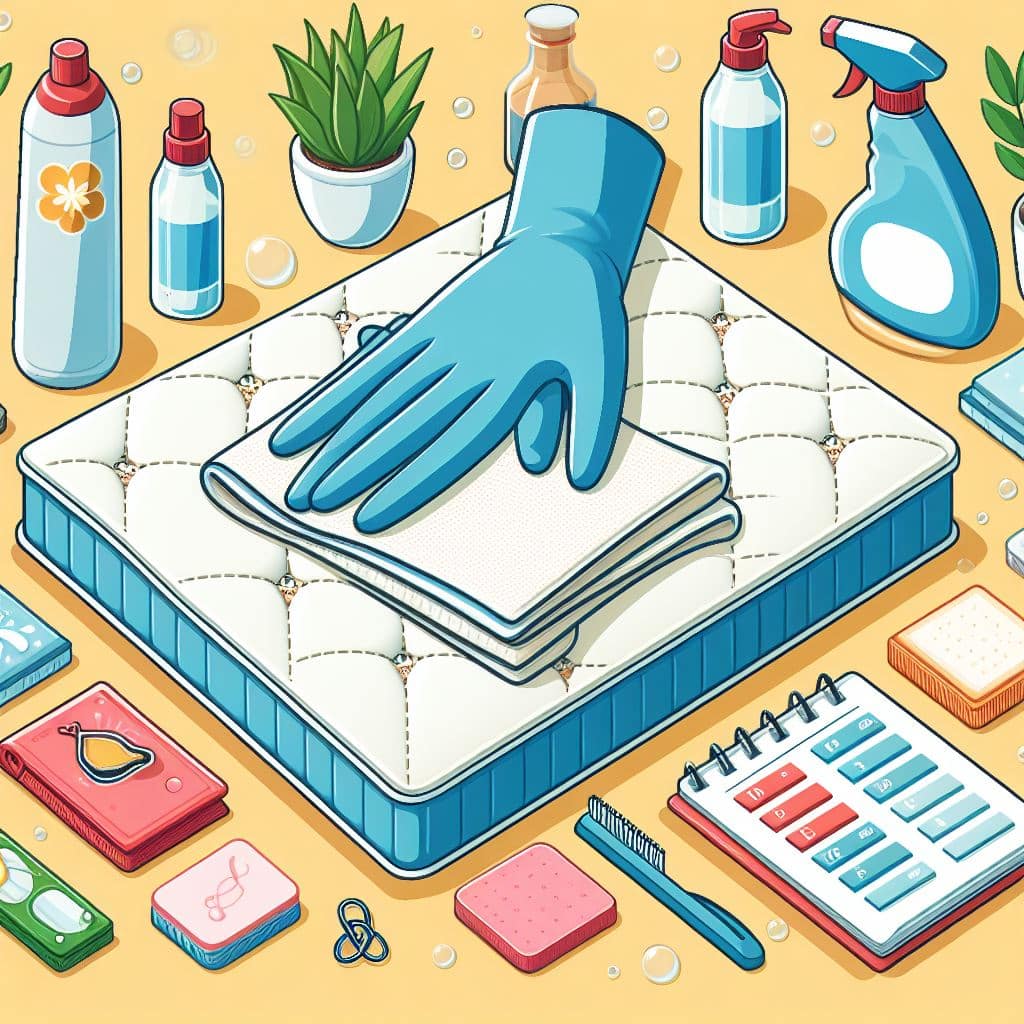
Sleeping on a clean mattress is a must. Think of all the dust, spills, and smells! But bleach? Not the best choice. It’s harsh and can harm your mattress. No worries—there’s a safe way to make your mattress spotless again.
Pre-cleaning Preparation And Vacuuming
Strip the bed. Take off all sheets and covers. Wash them in hot water. This kills dust mites.
Gather supplies. A vacuum with an upholstery attachment, some baking soda, and mild detergent is all you need.
Vacuum thoroughly. Start from the top. Work your way down in overlapping, narrow paths. Don’t miss the sides.
Spot Cleaning And Deodorization Methods
Tackle fresh spills quickly. Use a dry cloth to blot—don’t rub. For old stains? Let’s go step by step:
- Mix a solution. Use two parts water to one part mild detergent.
- Apply gently. Dab the solution on the stain. Use a white cloth to avoid dye transfer.
- Blot again. With a new dry cloth, press down on the treated area. This helps lift the stain.
Time to deodorize. Sprinkle baking soda over your whole mattress. Leave it for several hours. Then, vacuum it up. Your mattress will smell fresh and be much cleaner.

Tips For Maintaining Mattress Cleanliness
Keeping your mattress clean is vital for a fresh, hygienic, and comfortable sleep environment. Clean mattresses can help prevent allergens, dust mites, and bacteria from disrupting your sleep. Here are some practical tips to ensure your mattress remains spotless and well-maintained.
Regular Cleaning Schedule
Set a routine for a regular cleaning schedule. It ensures your mattress stays clean and increases its lifespan. Here’s a simple guide you can follow:
- Vacuum your mattress monthly to remove dust and allergens.
- Spot clean stains immediately to prevent them from setting.
- Turn or flip the mattress every three months to wear it evenly.
Using Protective Covers
To keep your mattress in top condition, invest in a quality protective cover. Covers defend against spills, stains, and wear.
| Type of Protector | Benefits |
|---|---|
| Waterproof Covers | Protects against spills and accidents. |
| Hypoallergenic Covers | Shields against allergens and dust mites. |
It’s essential to wash protective covers regularly. Follow the manufacturer’s instructions for washing and drying. This helps maintain a clean, healthy sleep surface.
The Risks Of Diy Mattress Cleaning
Cleaning a mattress might seem straightforward, but it’s fraught with potential pitfalls. A wrong move could leave you with a damaged mattress. Let’s explore some risks associated with DIY mattress cleaning.
Potential Damage From Improper Cleaning Techniques
Bleaching your mattress could seem like a forceful way to rid it of stains. But it’s a risky move. Here’s why:
- Fabric damage: Many mattresses have delicate fibers. Strong chemicals can break them down.
- Color Alteration: Bleach might strip away colors, leaving your mattress patchy.
- Structural compromise: Excessive liquids can seep into the inner layers. This could harm the mattress’s structure.
Use milder solutions and gentle techniques instead of harsh chemicals. Consider spot cleaning for small areas. Let’s also recognize when it’s time to seek help from pros.
Recognizing When To Call Professionals
Determine whether your mattress needs expert cleaning:
- Stubborn Stains: Some spots won’t budge with home remedies. Pros have the right tools.
- Persistent Odors: Lingering smells could need deep cleaning. Experts know how to remove them.
- Mold and Mildew: These issues require professional attention for health and safety.
- Warranty Concerns: DIY methods could void your warranty. Check with manufacturers before DIY.
When in doubt, consider a pro. They diagnose problems accurately and suggest appropriate treatments.
Best Practices For Mattress Hygiene
Caring for your mattress is key to a good night’s sleep. It helps keep your bed fresh and clean. Follow these best practices to ensure your mattress remains in top shape.
Summarizing Mattress Cleaning Dos And Don’ts
It’s essential to know the right and wrong ways to clean your mattress. Here’s a quick checklist:
- Do vacuum your mattress regularly.
- Do use a gentle stain remover for spills.
- Do let your mattress air out often.
- Do not soak your mattress; moisture can lead to mold.
- Do not use harsh chemicals like bleach, which can damage the fabric and interior materials.
Final Recommendations For A Clean And Healthy Sleeping Environment
Keep your sleeping area clean and safe with these tips:
| Frequency | Action |
|---|---|
| Weekly | Change bed linens and vacuum mattress surfaces. |
| Monthly | Spot-clean any stains and deodorize with baking soda. |
| Seasonally | Flip or rotate your mattress for even wear. |
| Yearly | Professionally clean your mattress for deep hygiene. |
Remember, a clean mattress leads to better sleep. Care for it well, and enjoy the comfort every night.
Frequently Asked Questions On Can You Bleach A Mattress
Is Bleaching A Mattress Safe?
Bleaching is potent and can disinfect a mattress, but it’s essential to use a diluted solution. Direct application of bleach can damage fabrics and void warranties. Always spot test before full application and ensure proper ventilation.
How Do You Bleach A Mattress Correctly?
To bleach a mattress, mix a small amount of bleach with water. Use a spray bottle to apply the solution lightly. Avoid saturating the mattress. Let it sit for a few minutes, then blot dry with a clean cloth.
Can Bleach Remove Mattress Stains?
Yes, diluted bleach can help remove certain stains from a mattress. It’s effective against mold, mildew, and similar stains. Bleach should not be used for protein-based stains like blood, as it can set them.
What Are Bleach Alternatives For Mattresses?
Baking soda, vinegar, and hydrogen peroxide are safer alternatives to bleach for cleaning mattresses. They are effective at removing odors and stains without the risks associated with harsh chemicals.
Will bleach ruin a mattress?
Bleach can potentially ruin a mattress as it is a harsh chemical that can damage fabric and discolor materials. It is advisable to avoid using bleach on mattresses and opt for milder cleaning solutions to prevent any adverse effects on the mattress’s integrity.
What is the best way to disinfect your mattress?
The most effective way to disinfect your mattress is to mix a solution of equal parts water and distilled white vinegar in a spray bottle. Lightly mist the mattress with the solution, allowing it to air dry completely, as vinegar has natural disinfectant properties that can help eliminate bacteria and odors.
Conclusion
Sanitizing a mattress matters for a restful sleep environment. Using bleach is risky and requires caution. Consider alternative cleaners or hire professionals. Proper mattress care ensures longevity and hygiene. Remember, safety first—sleep peacefully on a clean, well-maintained bed.

